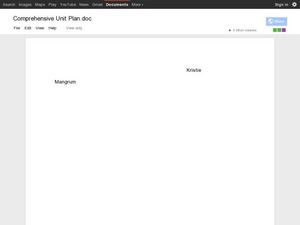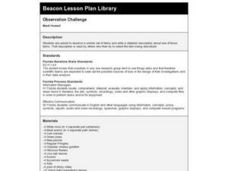Curated OER
Invertebrate Diversity
Comparative anatomy prevails in the lesson exploring diversity among invertebrates. Biologists examine physical characteristics of an earthworm from phylum annelida and a meal worm from phylum insecta. They also inspect a cricket and a...
Curated OER
Getting to Know You: Meal Worms
Students recognize differences between themselves and other people, and accept their uniqueness as a positive gift, by studying meal worms.
Curated OER
Take A Meal Worm To Lunch
Seventh graders, using a magnifying glass, observe mealworms in a cup.
Curated OER
Food Preference Experiment: Mealworms
In this meal worms worksheet, students test which foods the mealworms like the best between potato chips, fruit, and bread. Students complete 5 questions.
Curated OER
Animal Activities: Teacher's Pets
Students watch meal worms turn into beetles in the classroom.
Curated OER
Mealworm Exploration
Second graders explore and discover different things about mealworms. In this mealworms lesson plan, 2nd graders look at, play with, and try to manipulate meal worms.
Curated OER
Aztec Food
Combining social studies and geography, pupils identify the various foods eaten by the Aztecs. They create a recipe for an Aztec evening meal, including preparation instructions. Next, they explain why the Aztecs ate foods commonly found...
Curriculum Corner
"Would You Rather?" Writing Prompts
Would you rather eat a cricket or a worm? Have your young writers decide and write about why. Choose from 35 different writing prompts to spark interest and creativity. Even your most reluctant writers are sure to enjoy. Each prompt also...
Curated OER
Mini-Ecosystems
Third graders identify the living and non living things in a book read aloud and discuss the interactions represented in the book. Then, they research and include a list of food that each animal needs in an ecosystem. Finally, 3rd...
Curated OER
How to Keep a Scientific Journal
Students record observations of a living organism over a period of time. They observe meal worms and record their observations in a scientific journal.
Curated OER
Observation Zooming
Sixth graders use zoom lenses to observe meal worms and draw them from three different zoom levels. They complete their artwork in sketchbook and complete a questionnaire about their abilities as scientific artists.
Curated OER
Hey, Look Me Over!
Students make observations about mealworms using hand lenses, rulers, and cotton swabs. Students complete their own mealworm observation chart, then they share their observations with the class. This is one station out of five in an...
Curated OER
Cows, Worms, and Compost
Students study decomposition. In this decomposition instructional activity, students discuss the background information about decomposition. Students then complete the 'Chew It Twice' worksheet.
Curated OER
Cycles and Starting Mealworms
Here is a fascinating lesson about the life cycles of plants and animals, and other cycles found in nature. Learners explore the cycle of the moon, the tides, and other sequences of events in every day life. The big activity is the...
Curated OER
Wet or Dry Experiment
Practice the scientific process by testing whether mealworms prefer a wet or dry environment. This is an engaging experiment to use as an example of how to go through the steps of the scientific method. Elementary schoolers can work in...
Curated OER
Clay Ants: Insect Anatomy
Students examine anatomic structures in order to identify insects from other living organisms. They gain a level of comfort from anxiety when observing and handling live and pinned insects. They create clay models of an insect.
Curated OER
Investigation 3 - Terrariums / Aquariums
Third graders create aquariums or terrariums to explain how creatures depend on living and nonliving things.
Curated OER
Synonym Surprise 1, 2, 3, 4, 5
In these five recognizing synonyms worksheets, students read short stories and use word banks to choose synonyms to replace the underlined words. Students rewrite 5 stories replacing 30 synonyms.
Curated OER
The Life Cycle of the Mealworm
Fourth graders provide a habitat for live mealworms and observe their life cycle. In this animal life cycle and scientific inquiry activity, 4th graders create a habitat for a live mealworm and observe and record related data as it...
Curated OER
Pronoun Agreement
Cross your t's, dot your i's to make sure your pronouns are in agreement. This instructional activity provides great practice for identifying incorrectly-used pronouns. In total, there are 10multiple choice problems. Tip: Use this as a...
Curated OER
Observation Challenge
Fourth graders, in groups, use observation skills at 12 stations and describe what they see.
Curated OER
Mealworms: Warm or Cold?
In this mealworms learning exercise, students test if the mealworms like warm or cold areas. Students complete 5 questions total on this learning exercise.
Curated OER
Lesson Plan 3: Great Book, Gross Book
It's time for your scholars to become book reviewers! Start with a fun review of foods: are they good or gross? Learners apply these evaluation techniques to books, recording their thoughts on large pieces of butcher paper. Simply have...
Other popular searches
- Meal Worms Color Preference
- Meal Worms Activities
- Crickets and Meal Worms
- Meal Worms for Chameleons
- Meal Worms Metamorphosis
- Science Meal Worms
- Life Cycles Meal Worms
- Meal Worms Maze
- Insects Meal Worms
- Meal Worms and Chameleons
- Racing Meal Worms
- Meal Worms Metamorphasis























